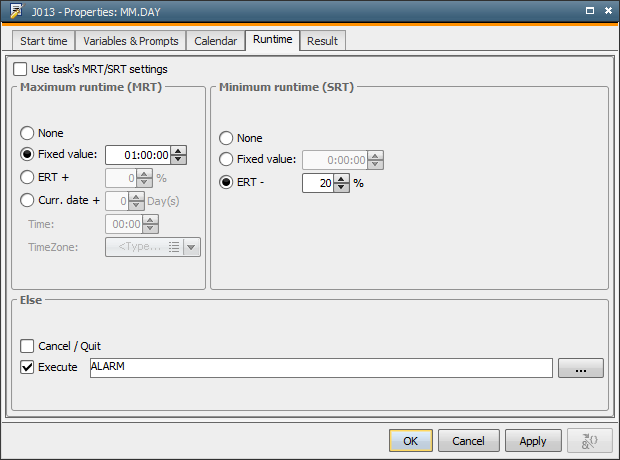
|
Calendar Tab |

Properties of Objects |
Result Tab |

|
 Runtime Tab
Runtime TabThe Runtime tab can be used to monitor the runtime of a task in a Schedule object. It is possible to monitor the maximum and/or minimum runtime of this task and to react to deviations.
The possible settings largely correspond to those made in the object's Runtime tab.

Example:
The above example allows a minimum runtime of two hours for
this task in the Schedule object. If this time cannot be kept, the night shift will be informed with an object of the same name. The maximum runtime is not
monitored. Possible settings for runtime monitoring which has been specified in the
task itself are not considered.
|
Field/Control |
Description |
|---|---|
|
Use MRT/SRT settings of the task |
Settings for runtime monitoring are taken from the object. If this check box is not activated, you can define your runtime monitoring settings for the task in this window. The task settings specified in the workflow override those defined in the object itself. |
|
Maximum runtime (MRT) |
|
|
None |
The maximum runtime is not monitored. |
|
Fixed value |
The maximum runtime is monitored. Time is specified as a fixed value in the format "hours:minutes:seconds". An action can be specified for the case that the maximum runtime is exceeded (refer to Else section). |
|
ERT |
The maximum runtime is monitored. The estimated runtime (ERT)for this task is used as the maximum runtime. Refer to the Else section to specify what should happen if the maximum runtime has been exceeded. |
|
+ ... % |
When selecting ERT as the maximum runtime, you can also specify a correction value in percent. The calculated value will then be added to the estimated runtime. |
|
Curr. date + day(s) Time |
The maximum runtime is monitored. Examples: 0 days = the day of task activation A point in time is set when the task should have finished. The number of days is counted from the task's activation onwards. 2 days = two days after task activation Allowed values: 0 - 99 Refer to the Else section to specify what should happen if the maximum runtime has been exceeded. |
|
TimeZone |
TimeZone that should be used. |
|
Minimum runtime (SRT) |
|
|
None |
The minimum runtime is not monitored. |
|
Fixed value |
The minimum runtime is monitored. The minimum runtime is used as a fixed value in the format "hours:minutes:seconds". Refer to the Else section to specify what should happen if the minimum runtime has been exceeded. |
|
ERT |
The minimum runtime is monitored. The estimated runtime of the task is used as its minimum runtime. Refer to the Else section to specify what should happen if the actual runtime is shorter than the minimum runtime. |
|
- ... % |
When selecting ERT as the minimum runtime, you can additionally specify a correction value in percent. The calculated value will then be subtracted from the estimated runtime. |
|
Else |
|
|
Cancel / Quit |
If this check box is activated, the task will be canceled or ended when its runtime is above the expected value. Only available when the maximum runtime is being monitored. |
|
Execute |
Object that should start if the runtime is above or below the expected value. Enter the name of the object or select it directly from a small Explorer (refer to the three dots to call it. |
In the example shown above, the Schedule object neither checks the maximum nor the minimum runtime.
A "T" is displayed in the graphical display when the Runtime tab is used.

See also:
Runtime Evaluation
Runtime Monitoring